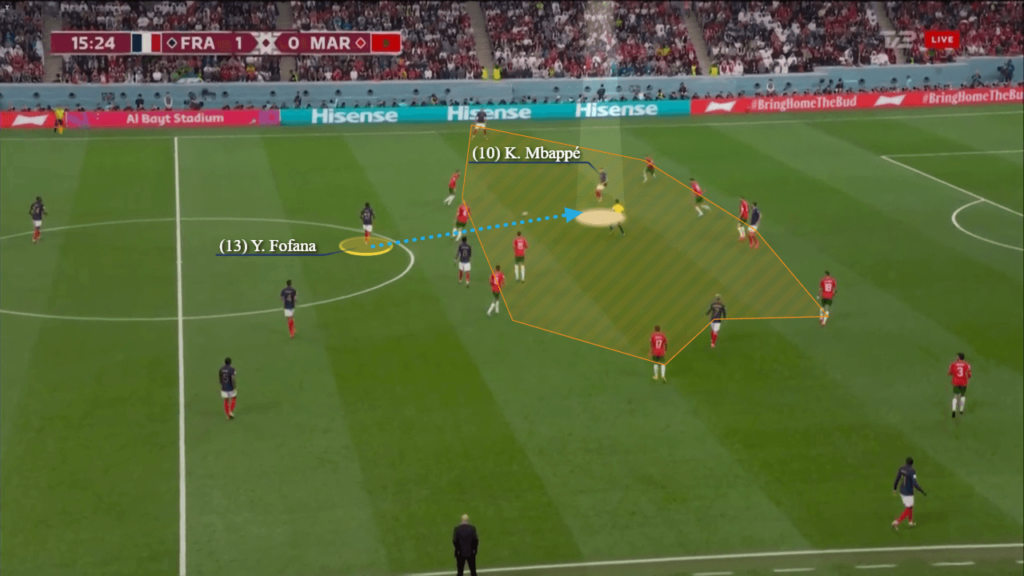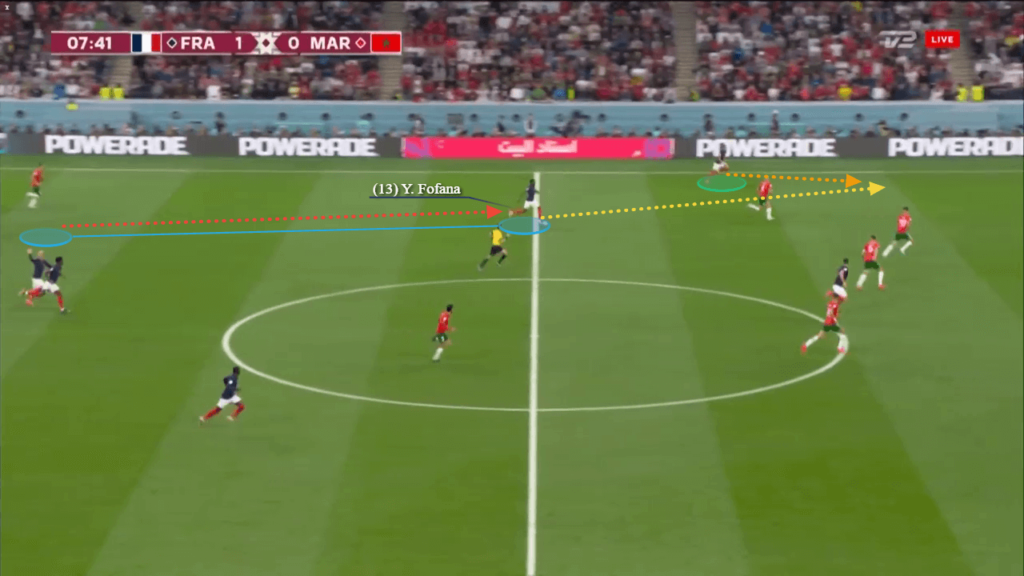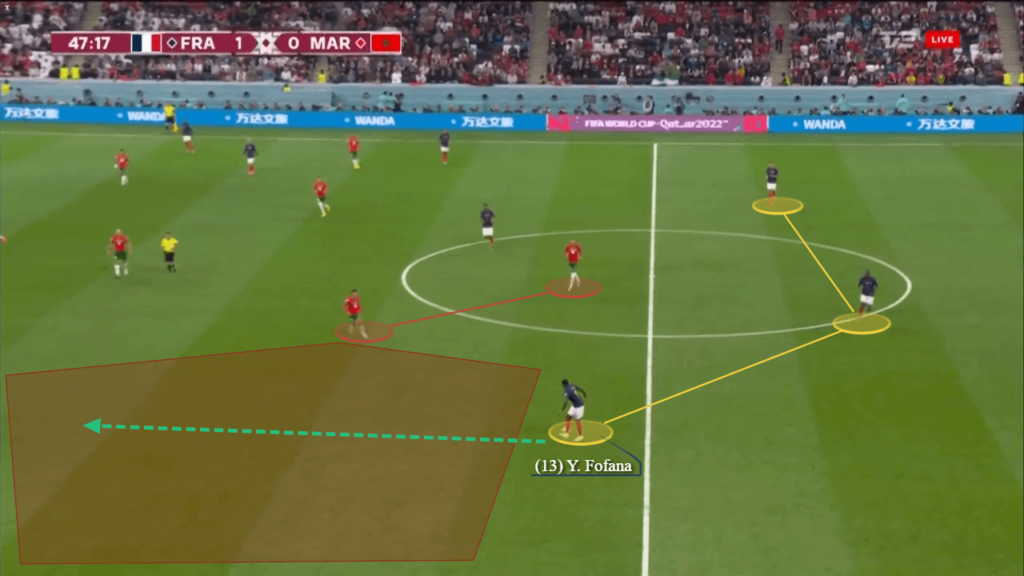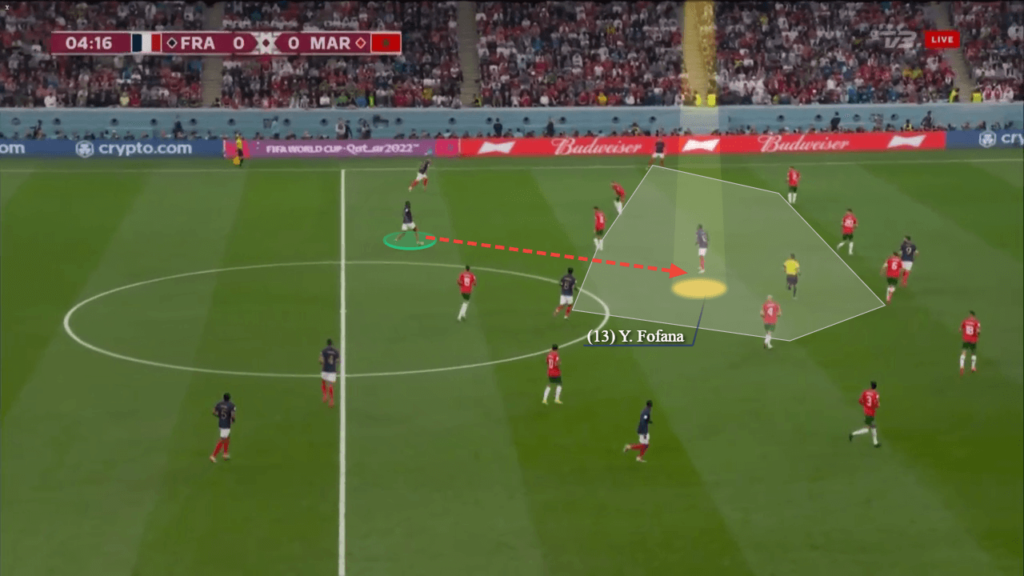World Cup Analysis: Imposing Fofana holding his own for France

With Adrien Rabiot unable to take his place for France in their World Cup semi vs. Morocco due to illness, AS Monaco star Youssouf Fofana stepped up admirably to replace him by putting in an accomplished shift in central midfield.
Slotting in next to Antoine Griezmann and Aurelien Tchouameni, who he excelled alongside for Monaco in the last couple of years before Tchouameni left for Real Madrid, Fofana hardly put a foot wrong throughout the 2-0 victory.
Rising to the occasion and handling the pressure manfully in what was his fifth appearance and second start at the showpiece, the 23-year-old certainly didn’t look out of place, holding his own in the middle of the pitch.
Fulfilling his roles and responsibilities smoothly on both sides of the ball, there was much to like about his efficient and effective body of work.
Seeing as France were content sitting deeper for large periods of the match and only had 39% possession, his presence was vital in keeping Morocco at bay in his designated area of operation.
Remaining concentrated and disciplined, he knew when to step out to press, drop back, shift across, cover for a teammate, track runners from midfield or get out to support Kylian Mbappe in wider areas. Awake to the danger posed by Achraf Hakimi’s underlaps and Hakim Ziyech’s nous, plus Selim Amallah’s probing when he came on, it was admirable how alert he was to these threats.

So aware of triggers and what was going on around him, if he wasn’t defending in a compact shape, the way he chimed in with some vital interventions to break up play further caught the eye. Picking his moments to pounce, the energetic, aggressive and long legged Fofana was constantly on hand to regain possession for France with his shrewdly timed challenges. Indeed, the fact he won 13 duels, made 11 ball recoveries and nipped in with three interceptions aptly illustrated his worth here.


Also quick to close down opponents immediately after France lost the ball, his counterpressing and decision making saw him help his team deal with transitions, so they weren’t exposed to too many dangerous opposition counters.

Attentive, imposing, excellent in his judgement and a real ball winning machine, there was no doubting what a key man he was on the defensive end – just like he is for Monaco.
Meanwhile, in terms of his attacking output, Fofana did many things well here as well. Getting the fundamentals spot on and knowing the onus wasn’t on him to be a creative force, he performed his duties coherently.
Passing the ball crisply, Fofana was proficient at getting the ball into France’s lethal attackers and recycling possession if the progressive option wasn’t on. While he predominantly kept things simple, there were, however, a couple of instances where he struck some measured line breaking passes to colleagues between the lines and slid some handy through balls in behind and down the channels.



Much upside could also be extracted from how he embarked on some of his trademark dribbles to gain territory and draw out defenders. One moment that especially stood out was his marauding 79th minute surge, where he used his strength and power to burst upfield before finding Mbappe, with this serving as the catalyst for France’s second goal.

The former Strasbourg maestro’s movement also warranted mention, for he shrewdly mixed things up to keep his markers guessing. Whether pushing up between the lines of Morocco’s midfield and defence, dropping deeper to form a temporary back three, interchanging with Tchouameni to operate at the base of midfield or pulling wider, his positional awareness, understanding of his role and relationships with his colleagues ensured he was tough to keep tabs on.




Following his quality effort, Fofana’s certainly given Les Bleus manager Didier Deschamps plenty to ponder ahead of the final, for the hard running, defensively resolute Fofana’s display has undoubtedly put him in contention to start the final.
Bringing structural security, balance, tactical acumen and energy, it’ll be intriguing to see what Deschamps does, for Rabiot brings more offensively, but Fofana’s the better fit defensively and works better within the collective.
Showing he belongs at the level and is now comfortable in the international arena, his recent comments underlined this precisely, with the man who only won his first cap back in September clearly feeling ready for battle whenever he’s called upon.
“As a newcomer [to the squad], we come to discover this great competition. Whether you are 23 or 30, the first World Cup is always important. As a competitor, I will do everything to earn my place in the 11, like the 26, but always with respect for my teammates,” he insisted.
“As I said, it’s on the field that speaks. The coach validated me. After the first game [debut against Austria], everyone validated me too! I no longer have time to tell myself whether I am happy or proud. The competition starts in two days. Two major players are absent [Pogba and Kante], but they also started in the France team one day. There is a beginning for everything.”
Taking full advantage of his opportunity to put his best foot forward to start the biggest game in football, Fofana’s solid semi final showing might just have given him the edge over Rabiot to get the nod for France’s epic showdown with Argentina come Sunday.








